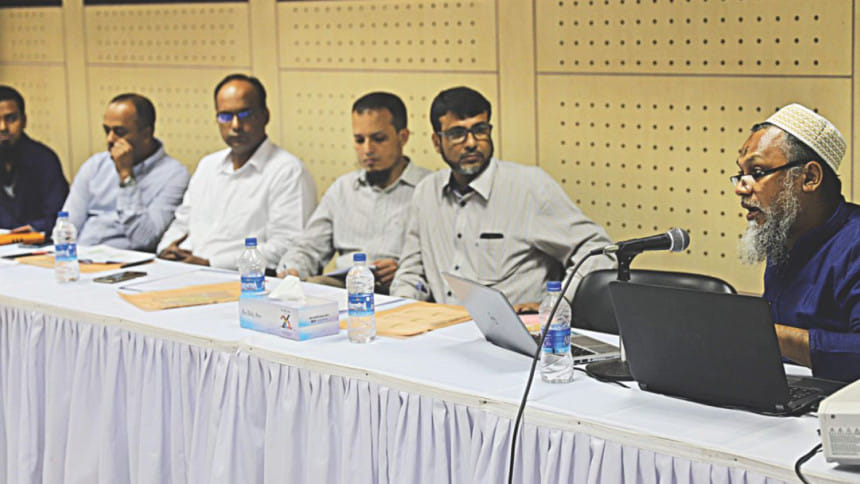Easy bikes outgrowing limitations

Easy bikes have made a major leap in the last few years, growing from an initial few to a million vehicles amid a debate on whether they should be allowed or not, according to a new study.
The joint study by the Asia Foundation and Rahimafrooz Solar showed that easy bikes currently transport 2.5 crore passengers in both townships and rural areas every day and has created jobs for 30 lakh people.
The findings of the study were shared yesterday at a seminar styled “Promoting Standard and Energy Efficiency of Electric Vehicles to Meet SDGs” held at The Daily Star Centre in Dhaka.
The locally assembled, non-formal three-wheel electric vehicle has shown immense potential in: conserving the environment, the use of green energy, job creation, developing a local automobile industry and a revolution in the mass transportation system in Bangladesh, according to the study.
On a stop-gap arrangement, easy-bikes are now plying on road with parking number given from city corporations, municipalities and union councils, said the study report.
Due to some procedural and mechanical shortcomings, the Bangladesh Road Transport Authority is unable to register easy bikes as motor vehicles and provide licences, route permits and fitness certificates.
Subsequently, speakers at the seminar urged the government to formulate a policy with well-defined and clear rules to bring the mushrooming of easy bikes under a legal framework so that those can be run in a disciplined and safe manner.
The whole world is moving towards electric vehicles, so Bangladesh cannot keep its distance from the growing trend for long, said Ijaz Hossain, a professor of the chemical engineering department at the Bangladesh University of Engineering and Technology.
“In Bangladesh, easy bikes have expanded massively without any government intervention, but there is no vision and control,” he said, adding that the government needs to be proactive and should formulate a policy to allow easy bikes to grow in a sustainable way.
Easy bikes are also good from the viewpoint electricity load: they are charged at night and so they do not disturb the supply. “What is more, as they are charged at night, electricity is also being sold,” said Prof Hossain.
Some Tk 13 crore is spent every day for charging easy bikes, said Quazi Ahmad Faruque, head of access to energy of Rahimafrooz Renewable Energy.
About Tk 12,500 crore has been invested in easy bikes so far, he said, adding that a large number of low-income people are making a living through the electric vehicle.
Easy bikes have a multiplier effect on the economy: it has reduced the cost of transportation and created jobs with no carbon emission and air pollution. Some 76 percent of the respondents in the study favoured easy bikes, as it is very useful for transporting people and goods at low fares.
Despite the advantages, conventional batteries in electric vehicles at present rely on unauthorised charging stations that usually get power illegally from the grid and need almost 10 hours to fully charge, Faruque said.
To this end, Palli Bidyut Samity and West Zone Power Distribution Company in collaboration with Rahimafrooz Solar have installed four solar charging stations for easy bikes and rickshaws on a pilot basis.
“The study report implies that current limitations of charging electric vehicles can be surpassed with modern super-fast charging technology powered by solar energy,” Faruque said. Electric vehicles have the potential to reduce the adverse impacts on the environment and dependency on imported fuel or compressed natural gas, while promoting energy efficiency and renewable energy to alleviate pressure on grid electricity.
“Electric vehicles are now competitive in many ways: it has simple mechanics, no internal combustion engine, require less equipment and is easy to assemble.”
Some 19 lakh batteries are used in easy bikes every year, according to Mohammed Shahidul Islam, secretary of the Bangladesh Accumulator & Battery Manufacturers Association. Speakers called for amending Motor Vehicles Ordinance, 1983 to legalise easy bikes and plugging holes in policy vacuum in many areas.
They also said easy bike drivers do not have licences and have received little training, putting passengers' lives at risk.
This sector has become very big so it can not run without a policy, they said, adding that the government was in fact losing revenue by not giving attention to easy bikes.
The issue of battery-run vehicles also came up at a hearing on retail power tariff at the Bangladesh Energy Regulatory Commission (BERC) on Tuesday.
BERC Chairman Monowar Islam, who presided over the hearing, backed the proposal incorporating battery-run vehicles in the tariff plan. “The world is increasingly moving towards electric vehicles. So we are taking this into consideration.”
Yesterday, Md Emdadul Haque, a member of the BERC tribunal, said the government should address the issue in line with the thoughts of the commission.

 For all latest news, follow The Daily Star's Google News channel.
For all latest news, follow The Daily Star's Google News channel. 



Comments